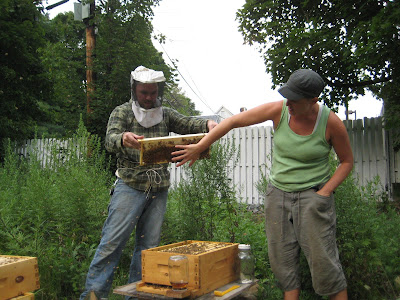




Exploring the relationships between people, plants, bugs and beings on the planet.






If you've visited the pumpkin patch at the Urban Farm at Lafayette, you may have seen first-hand the intricate connection between bees and flowering plants. Without bees - honeybees or otherwise - we would be pretty hard-strapped for food. 1/3 of our food supply in America is dependent on them to be exact. Pumpkins are just the beginning. Melons, squashes, blueberries, apples, nuts, alfalfa, clover, cocoa, vanilla, mango, plums, apricots, cherries, avocado, canola, broccoli, cabbage, cucumbers, cotton, carrots, coffee, and kiwi are just SOME of the crops that would not survive without the efforts of the bees. But can the bees survive without help from us these days?
According to the flyer that just came in the mail from a bee equipment supplier, they cannot. When I opened the mailed advertisement, the first page was told me that I had to put chemical and 'natural' remedies into my hive in order for my bees to be healthy and strong for the winter months. They craft yellow soy patties attempting to feed the bees protein posing as pollen. This little pamphlet is proclaiming the cheapest source of high fructose corn syrup to feed the bees you steal honey from. They sell essential oils to kill mites (which also kill microbes in the hive that may be beneficial to the bees), they sell prophylactic antibiotics to kill bacteria in the hive (some of which may be beneficial to the bees), they sell chemical insecticides to kill moths and beetles that can kill weak hives (which can also kill bees, they are insecticides after all!).
It may be a glum picture that I paint, but it follows what is innocently taught at most beekeeping courses throughout North America, and many people do not question the techniques. When walking into such an adventure as beekeeping, we tend to trust the people guiding the way, and usually those people have been using these invasive techniques because that is what they have been taught. It is, after all, how we will save the bees from disease and death.
But is it?
Mites are small parasitic bugs that attach to adult bees and bee larvae in order to feed off of them. Often the mites weaken a hive and bring in disease. If there are high mite levels in a hive, they can destroy that hive in a season, since they multiply much more rapidly than the bees. The 'organic/natural' approach to treating the bees for mites has been to apply essential oils (such as thyme) or acids (oxalic and formic). I have seen people use these and I am not convinced that they are all that 'natural'. Because bees use pheromones to communicate, the application of such strong oils will impair that ability (and if you want to use the wax for candles, your candles will end up smelling more like your treatment than the beautiful sweetness of bees!). Acids are caustic and can kill a hive if used incorrectly. These options don't seem viable to me.
Fortunately, a small movement has been forming here in the northeast around treatment free beekeeping. It is a more hands off approach to the bees, trusting that the bees know what the bees needs are and letting them follow their insticts rather than ours. Beekeepers are working hard at breeding bees that know how to deal with these mites. They are not breeding bees to produce tons of honey or to be gentle, they are breeding bees to survive. An average beekeeper looses 50% or more of their hives in the winter. Clearly the way bees are cared for nowadays is not working.
Last weekend I went to a treatment free bee conference in Leominster MA along with 100 other people from near and far. I didn't hear much about bees dying at this conference, it was more about bees thriving. Thriving and Swarming! A swarm is a hive's way of procreating. When the number of workers exceeds the capacity of the hive, the workers will rear a new queen and when she is ready to be born about a third of the hive will go out with the old queen and find a new place to live. This is how bees thrive. This is how the bees move and populate an area. Beekeepers today are taught to stop this from happening at all costs. Some beekeepers clip their queens wings so that she cannot fly away. Bees make honey and if 1/3 or your bees go away then 1/3 of your honey goes away too. The thing is though that when a swarm leaves there is a break in the brood cycle which gives the workers less nest tending time and possibly more honey gathering time. This gives the mites less food and less of a chance of survival. The new queen will generally be vigorous and create a strong colony just on the fact that they created her. Bees that swarm are more likely to survive according to the low numbers of winter deaths that the beekeepers at this conference were giving.
Maybe the bees could live without us, but the fact of the matter is is that we are in a relationship with them that is thousands of years old and we have to find our way to balance with the bees and the bee nature. The land is in it's full glory right now and it is our responsibility to tend it, with love and respect. First do no harm. Meaning, when we see a problem, we observe it for a while before we intervene, because the intervention could be more damaging than we imagined. Let the bees be!

